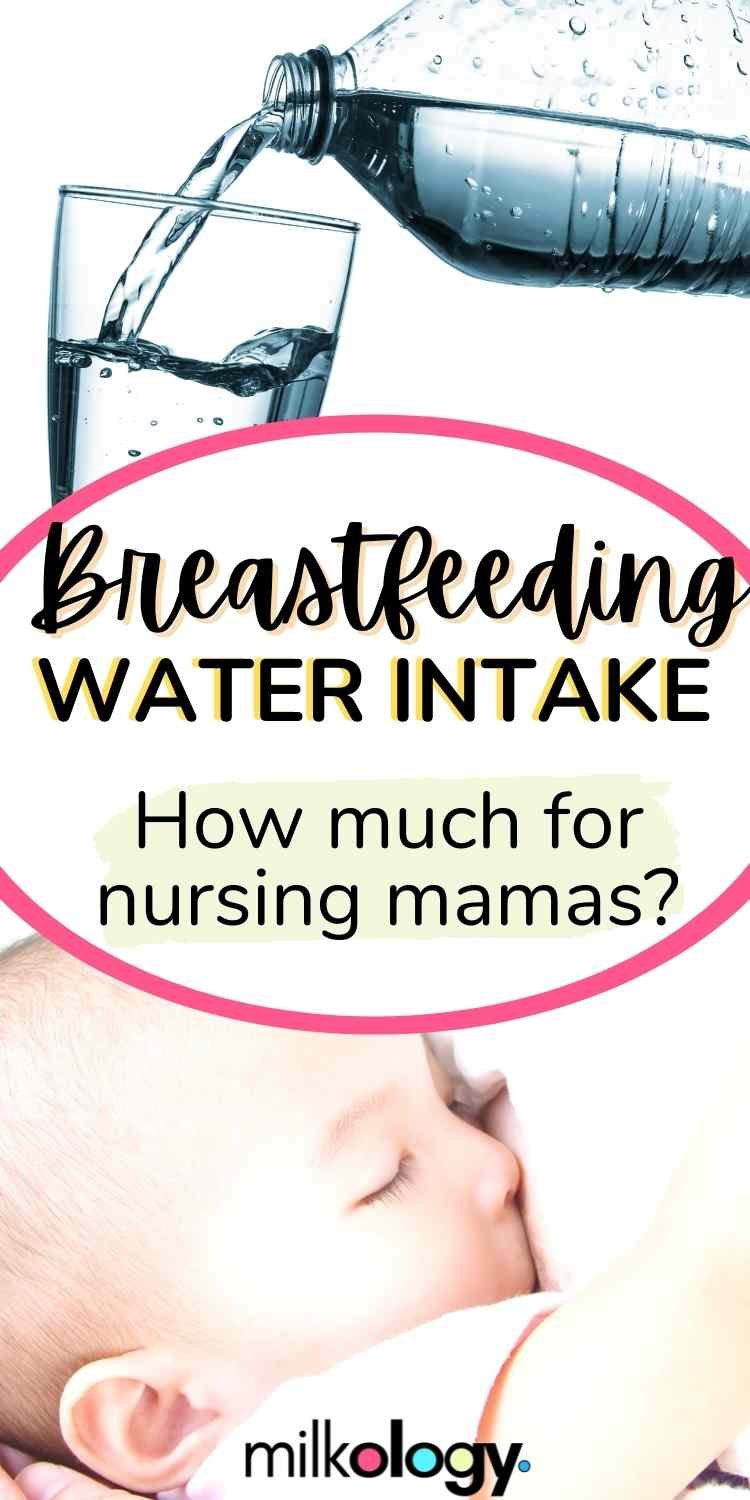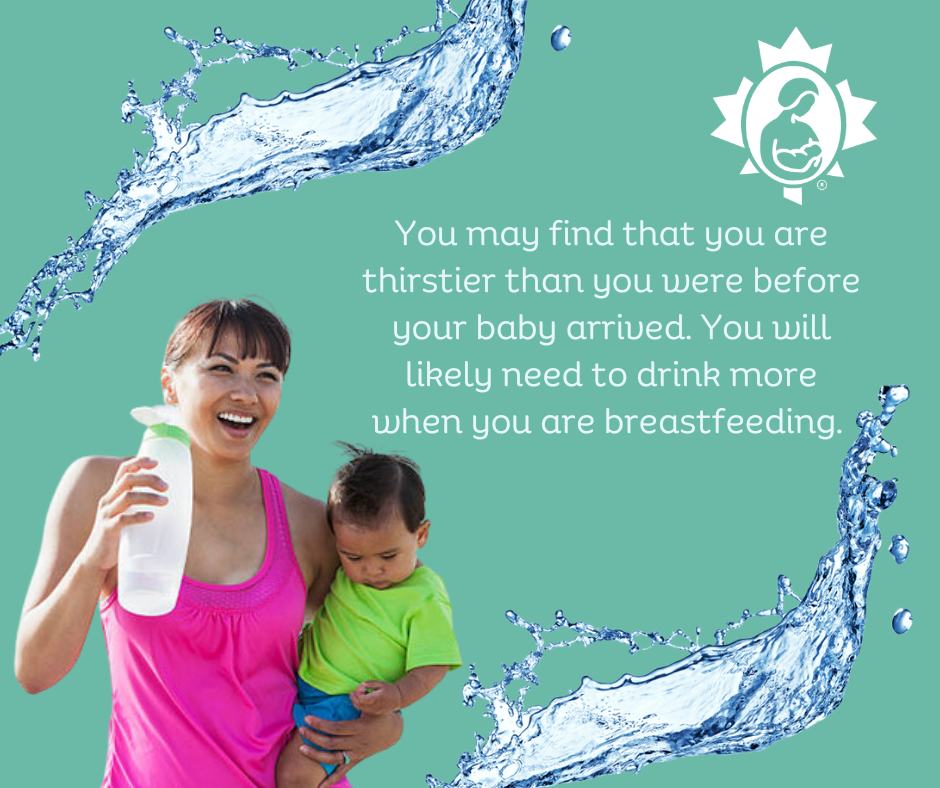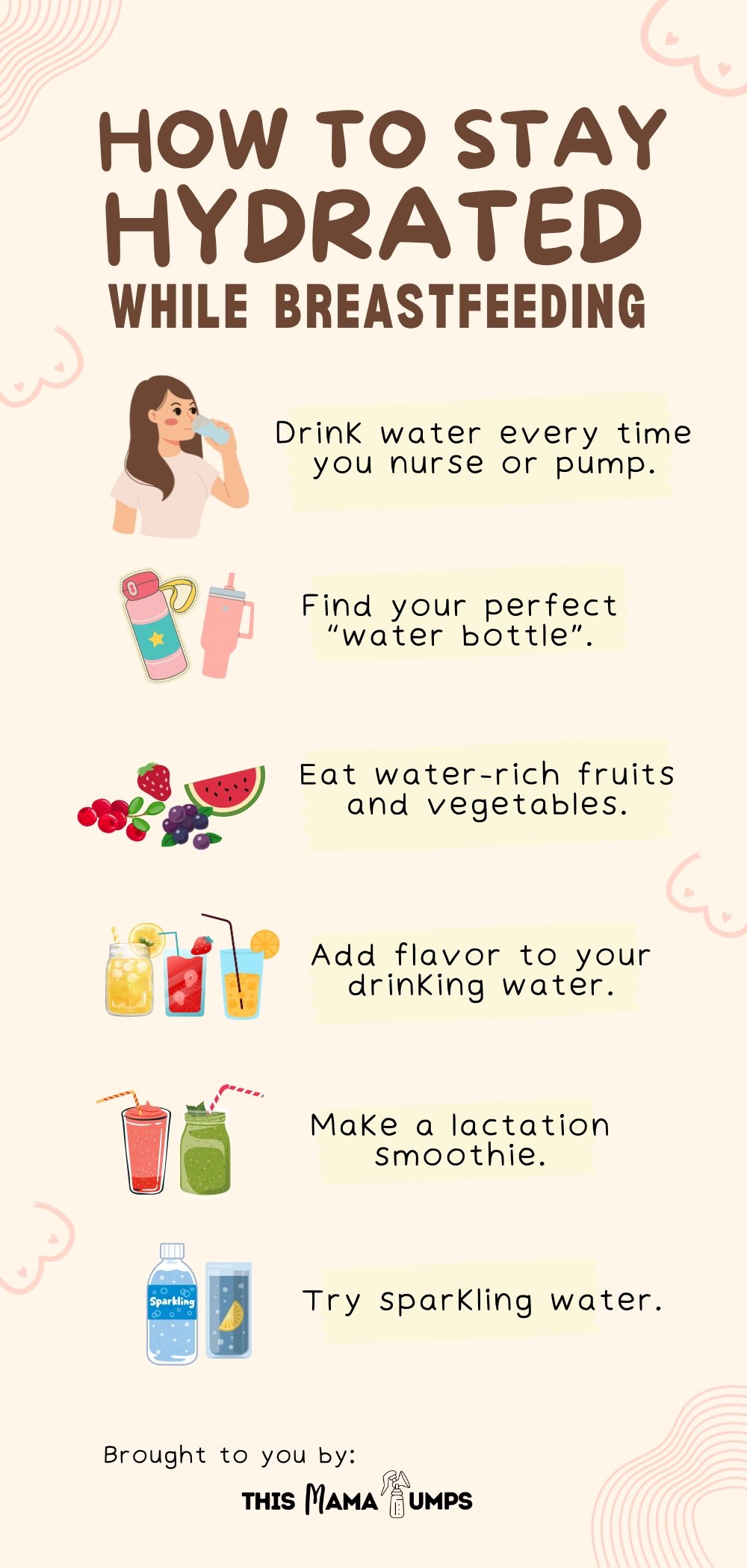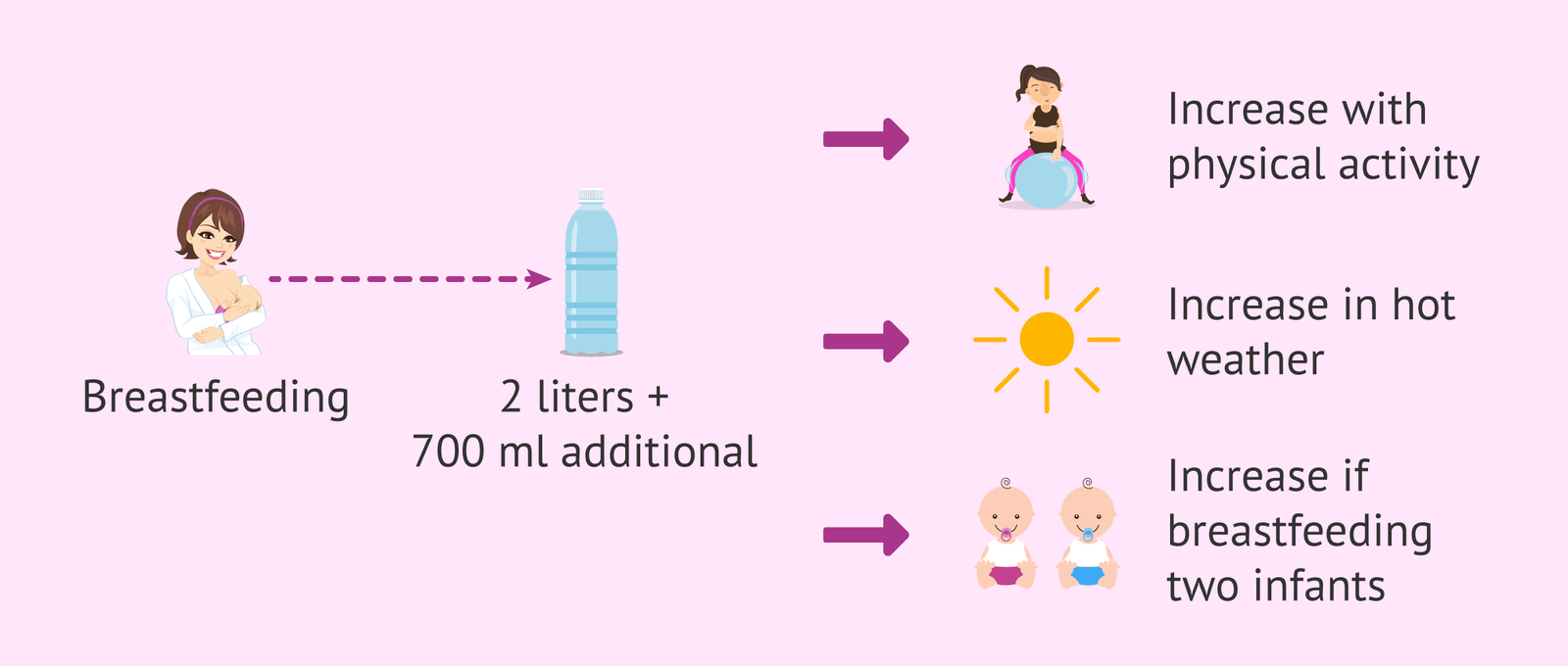Breastfeeding moms need extra hydration. Drinking enough water is crucial.
But how much is enough? Staying hydrated while breastfeeding can impact both you and your baby. Water helps produce breast milk and supports your own health. It can be tricky to know the right amount to drink. Some mothers worry about drinking too little or too much.
Your body sends signals like thirst to guide you. Yet, it’s easy to overlook these cues amid the demands of new motherhood. Understanding your hydration needs is important. This blog will explore how much water you should aim for daily. We’ll also discuss signs of dehydration and tips to maintain proper hydration. Stay tuned to ensure both you and your baby thrive.

Credit: milkology.org
Importance Of Hydration
Staying hydrated is crucial for everyone, but it holds special importance for breastfeeding mothers. As you nourish your baby, your body requires extra fluids to support milk production and maintain your own health. You might wonder how much water is enough and what happens if you don’t drink enough. Let’s dive into why hydration is key during this phase.
Benefits For Nursing Mothers
Hydration plays a pivotal role in keeping you energized and focused. When you’re well-hydrated, your body can better regulate temperature and maintain skin elasticity.
Dehydration can lead to fatigue and headaches. Drinking enough water helps prevent these issues, making your daily tasks more manageable.
Consider drinking a glass of water each time you feed your baby. This habit can ensure you stay hydrated throughout the day without having to track every ounce.
Impact On Milk Production
Your body uses water to produce breast milk. Adequate hydration helps maintain a steady milk supply for your baby.
Ever noticed a dip in milk production? It could be linked to dehydration. Keeping a water bottle handy may be a simple solution to support your milk supply.
Are you drinking enough? Your urine color can be a helpful guide. Pale yellow typically indicates adequate hydration, while dark yellow may suggest you need more fluids.
Remember, every mother is different. Listen to your body and adjust your water intake based on how you feel. Are there specific cues that tell you you’re thirsty or dehydrated?
Staying hydrated is not just about quantity but also about quality. Consider adding fruits with high water content like watermelon or oranges to your diet for added hydration.

Credit: www.lllc.ca
Recommended Water Intake
Staying hydrated is essential for everyone, especially for breastfeeding mothers. Water is vital for milk production and your overall health. But how much water should you drink while breastfeeding? Understanding your recommended water intake can help ensure you and your baby stay healthy.
Daily Hydration Needs
Breastfeeding mothers need more water than usual. Experts suggest drinking about 13 cups of fluids daily. This amount includes all beverages and foods with water content. Always listen to your body’s thirst signals. They are your best guide to staying hydrated.
Factors Influencing Intake
Several factors can influence your water intake needs. Climate plays a significant role. In hot weather, you may need more water. Your activity level also affects how much you should drink. Active mothers require more hydration. Your diet can impact water needs too. Foods high in water content can help meet your daily intake.
Pay attention to your body and adjust your intake as needed. Every mother’s hydration needs can differ. Always keep water accessible and drink throughout the day.
Signs Of Dehydration
Breastfeeding moms should watch for dehydration signs like dry skin, fatigue, and dizziness. Drinking enough water is essential to maintain milk supply and overall health. Aim for at least eight to ten glasses daily, adjusting for activity level and climate.
Breastfeeding is a beautiful journey, but it demands a lot from your body, including increased water intake. Recognizing signs of dehydration is crucial to maintaining both your health and your breastfeeding routine. So, how do you know if you’re not drinking enough water? Let’s dive into the signs of dehydration and how it impacts your breastfeeding experience.Physical Symptoms
Your body will often signal when it’s dehydrated. Common signs include dry mouth, headache, and fatigue. You might notice your skin feels less elastic or your urine is darker than usual.These symptoms can sneak up on you, especially in the hustle and bustle of caring for a newborn. A friend of mine realized she was dehydrated when she felt unusually dizzy and tired. It was a wake-up call to prioritize her hydration.Taking the time to tune into these physical cues can help you catch dehydration early. This awareness is essential for keeping your body functioning optimally.Effects On Breastfeeding
Dehydration can affect your milk supply. Your body needs water to produce milk effectively. If you’re not drinking enough, you might notice a drop in milk quantity.Have you ever wondered why your baby seems hungrier than usual or isn’t satisfied after a feeding session? It could be linked to your hydration levels. Proper hydration supports the quality and volume of your breast milk.Consider keeping a water bottle handy during feedings. This simple habit can ensure you’re nourishing both yourself and your baby.Remember, staying hydrated is a direct way to support your breastfeeding journey. So, what steps will you take today to make sure you’re drinking enough water?
Credit: thismamapumps.com
Tips For Staying Hydrated
Staying hydrated is crucial for breastfeeding mothers. Water supports milk production and keeps energy levels steady. Many new mothers wonder about the right amount of water to drink. The key is to listen to your body and drink when thirsty. Here are some practical tips to maintain hydration while breastfeeding.
Simple Hydration Strategies
Carry a reusable water bottle at all times. Sip throughout the day. Make it a habit to drink a glass of water with each feed. Your body needs extra fluids for milk production. Set reminders on your phone to drink water regularly. Use apps that track your daily water intake. Hydration is about consistency, not just quantity.
Incorporating Fluids In Diet
Include water-rich fruits and vegetables in meals. Cucumbers, watermelon, and oranges are great choices. Soups and broths provide additional fluids. Herbal teas can be a soothing way to hydrate. Avoid caffeine-heavy beverages. They can increase fluid loss. Focus on natural, hydrating options. Smoothies made with water or milk can boost fluid intake.
Myths About Hydration
Breastfeeding mothers often wonder about the right amount of water to drink. Myths suggest excessive hydration is needed. Truth is, drink when thirsty. Listen to your body’s signals. Balance is key, not a fixed number.
Breastfeeding is an exciting journey filled with joy and challenges. One common concern many mothers face is staying adequately hydrated. With a plethora of advice available, it’s easy to get swept up by myths surrounding hydration. Let’s dive into some common misconceptions and clarify what science says about how much water you really need while breastfeeding.Common Misconceptions
Some believe you must drink gallons of water daily to maintain milk production. This idea can be overwhelming, especially for a new mom trying to juggle everything. You might have heard that thirst is a reliable indicator of hydration, but this isn’t always the case.Another popular myth is that clear urine signifies perfect hydration. While it can indicate adequate fluid intake, it’s not the sole measure of hydration health. Are you guilty of thinking you need to down a glass of water every time your baby feeds? This isn’t a steadfast rule either.Scientific Clarifications
Science tells us that breastfeeding increases your body’s need for fluids, but it doesn’t mean drinking excessively. On average, lactating women need about 3.1 liters per day, including all beverages and water-rich foods. However, individual needs can vary, so listening to your body is crucial.While thirst isn’t always a perfect indicator, feeling thirsty is your body’s natural way of signaling you need more water. Pay attention to these cues rather than sticking rigidly to a specific amount. Monitoring your urine color can be useful; aim for light yellow as a general guideline.Have you ever felt bloated from drinking too much water? This can happen if you follow myths rather than actual needs. Trust your body’s signals and adapt your water intake based on your daily activities and climate conditions.Reflect on your personal experiences with hydration. Have you found any tips that work well for you? Share your story with others; it might just be the insight another mom needs.Role Of Diet In Hydration
Breastfeeding mothers should drink enough water to stay hydrated. A balanced diet rich in fruits and vegetables supports fluid intake. Listen to your body’s thirst signals and aim for around 8-12 cups of water daily for optimal hydration.
Staying hydrated is crucial when you’re breastfeeding, and your diet plays a significant role in maintaining the right balance. While water is vital, the foods you consume can also contribute to your overall hydration levels. But how do you effectively combine food and fluid to ensure you’re well-hydrated while nursing?Foods With High Water Content
Certain foods can significantly boost your hydration. Think about adding fruits like watermelon, strawberries, and oranges to your meals. They are not only delicious but are also packed with water.Vegetables like cucumbers, lettuce, and zucchini are also excellent choices. These foods can make up a substantial part of your diet, providing hydration along with essential nutrients.Imagine having a fresh salad with a mix of these vegetables. It’s a simple way to increase your water intake without feeling like you’re constantly sipping from a bottle.Balancing Fluids And Nutrition
Hydration isn’t just about drinking water; it’s about balancing fluids and nutrition. While you focus on hydrating foods, don’t forget the importance of a balanced diet.Your body needs a variety of nutrients to support both you and your baby’s health. Consider how you can integrate proteins, healthy fats, and carbohydrates alongside hydrating foods.Have you ever wondered if your diet is contributing to your hydration or detracting from it? Pay attention to the signs your body gives you. Feeling thirsty all the time might indicate a need to adjust your diet, not just your water intake.By carefully choosing what you eat, you can support your hydration goals more effectively. Remember, it’s about the right balance to keep you feeling your best as you nourish your baby.Adjusting Fluid Intake
Adjusting fluid intake is crucial while breastfeeding. Your body needs extra water to produce milk. The right amount of water can vary. Factors like climate and activity level can change your needs. Listening to your body’s signals is essential.
Seasonal Variations
Weather impacts how much water your body needs. Hot summers can increase your thirst. You may sweat more in heat, losing fluids faster. In winter, thirst might decrease. But your body still needs hydration. Keep a bottle nearby to remind you to drink.
Activity Level Considerations
Your daily routine affects fluid needs. Active days require more water. Exercise and physical activities lead to fluid loss. Even light activities can increase thirst. Rest days may need less water. Adjust your intake based on your activity level.
Listening to your body is vital. Thirst signals guide your intake. Drink regularly throughout the day. Your milk production depends on your hydration. Proper fluid intake supports your health and your baby’s needs.
Consulting Healthcare Providers
When you’re breastfeeding, maintaining proper hydration is crucial for both you and your baby. But how do you know how much water you need? Consulting healthcare providers can offer the guidance you need. Their expertise can help tailor a hydration plan that suits your unique needs.
When To Seek Advice
Is your thirst constant, or do you feel unusually tired? These could be signs that you need more water. If you’re unsure about your hydration needs, it’s wise to consult a healthcare provider.
Think about how your body reacts to breastfeeding. Are you experiencing headaches or dry skin? These are signals that your water intake might need adjustment.
Don’t wait for dehydration to knock on your door. If you’re questioning your water needs, seek advice sooner rather than later.
Personalized Hydration Plans
Every breastfeeding journey is unique. Some mothers might need more water due to their lifestyle or body composition. A healthcare provider can create a personalized hydration plan for you.
Consider your daily routine. Are you more active or living in a hot climate? These factors can influence how much water you need, and tailored advice can make all the difference.
Why guess when you can have a plan that’s made for you? A personalized approach ensures you’re not just meeting basic hydration needs but optimizing your overall health.
Consulting a healthcare provider can take the guesswork out of hydration. It’s an actionable step that benefits both you and your baby. Have you considered the impact of proper hydration on your breastfeeding experience? It might be time to find out.
Frequently Asked Questions
How Many Ounces Of Water Should A Nursing Mom Drink?
A nursing mom should drink about 128 ounces (16 cups) of water daily. Staying hydrated supports milk production and overall health. Individual needs may vary, so listen to your body and drink when thirsty. Consult a healthcare provider for personalized advice.
Does Drinking More Water Increase Breast Milk?
Drinking more water doesn’t directly increase breast milk supply. Hydration is essential for overall health and milk production. Mothers should drink enough fluids to stay hydrated and maintain energy levels. Consult a healthcare professional for personalized advice on optimizing breast milk production.
What Happens If I Don’t Drink Enough Water While Breastfeeding?
Not drinking enough water can lead to dehydration, reducing milk supply. It may cause fatigue, headaches, and decreased energy. Staying hydrated supports optimal milk production and overall health for you and your baby. Aim for about 8-10 glasses of water daily to ensure sufficient hydration while breastfeeding.
How Much Water Should You Drink In A Day Of Nursing?
Nursing mothers should drink about 13 cups (104 ounces) of water daily. Staying hydrated supports milk production and overall health. Listen to your body’s thirst cues and adjust intake as needed.
How Much Water Should Breastfeeding Moms Drink Daily?
Breastfeeding moms need about 3 liters of water a day. It helps milk production and keeps you hydrated.
Conclusion
Hydration matters while breastfeeding. Drinking enough water supports milk production. Listen to your body. Drink when thirsty. Water needs vary for each person. Breastfeeding mothers might need more. Keep a water bottle handy. Sip throughout the day. Monitor your urine color.
Pale yellow is a good sign. Feeling dizzy or tired? You might need more water. Consult your doctor for personalized advice. Proper hydration benefits both mom and baby. Staying hydrated keeps you healthy and energized. Prioritize your water intake for a smoother breastfeeding journey.




